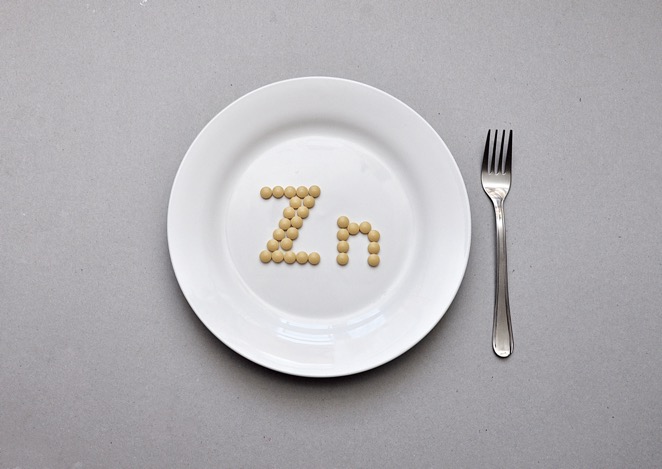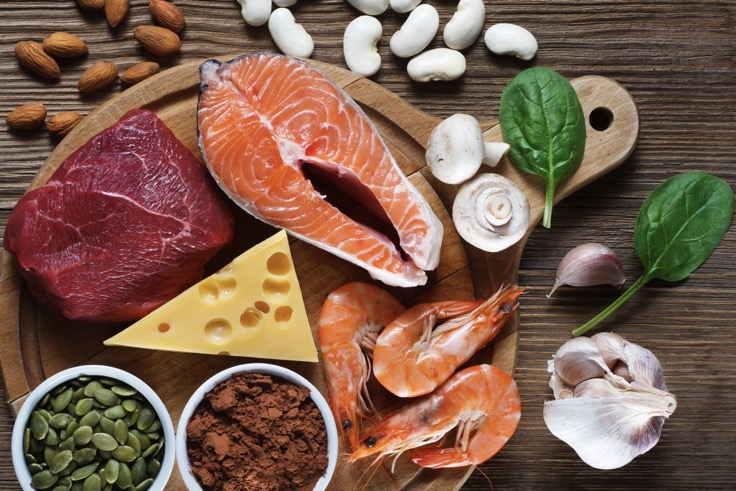Zinc is a trace mineral essential for health. Over 300 enzymatic reactions in the body require zinc, including digestive health, immune function, DNA transcription, blood glucose control, antioxidant defences, neurotransmitter production, and hormone regulation. Zinc is quite the mineral multi-tasker!
Zinc for skin
Zinc and healthy skin are best friends. It’s involved in keratin, collagen formation and wound healing. Ancient Egyptians were clued into zinc’s benefits, using it as an ingredient in topical creams for medicinal and cosmetic purposes.
How does zinc help acne-prone skin?
When it comes to acne, zinc has several potential skin superstar actions.
- Anti-inflammatory decreases inflammatory mediators like TNF alpha and IL-6
- Immunomodulatory, inhibits the bacteria Cutibacterium acnes
- Anti-androgen reduces the activity of the enzyme 5-alpha-reductase, resulting in less dihydrotestosterone (DHT) production
- Supports insulin release and blood glucose control
- Slows the production of sebum and keratin
- Helps in the transport of Vitamin A to the skin
- It is a direct-acting antioxidant
Who should use zinc for acne?
Zinc has been extensively researched as an acne treatment. The general trend of the studies is positive. Does everyone who has acne need zinc? No, it’s not a panacea. There are many drivers for acne, and supplemental zinc will only be of benefit if you need it.
Who is at risk for deficiency?
Low zinc can come about due to inadequate intake, impaired absorption, increased demands or increased excretion. These include
- Vegetarian or vegan diets
- Eating disorders (Anorexia nervosa, bulimia)
- Pregnancy and lactation
- Inflammatory bowel disease, cystic fibrosis
- HIV infection
- Excessive sweating (endurance athletes)
- Moderate to high alcohol consumption
- Chronic renal disease
Medications
Certain over-the-counter and prescription medications can reduce zinc when taken long-term.
**Never stop prescription medication without consulting your doctor.
- ACE inhibitors
- Antacids
- NSAIDs
- Anticonvulsant medications
- Hormonal birth control
- Inhalant, systemic and topical corticosteroids
- Histamine H2 agonists (e.g., Famotidine, Zantac)
Signs and symptoms of zinc deficiency
If you tick off a few of these signs and symptoms, you might suspect a zinc deficiency. Always confirm with testing.
- Loss of appetite, morning nausea
- Loose stools or diarrhoea
- Several white spots on the nails, papery, flaky nails
- Dry, flaky “fish scale” skin, flaking skin on the scalp
- Acne
- Oily/greasy hair
- Impaired immune function – frequent upper respiratory tract infections, mouth ulcers, cold sores, thrush, sore throats
- Hair loss
- Poor taste
- Poor eyesight
- Poor wound healing
- Weight loss
- Reflux/bloating due to low stomach acid
- Tinnitus
- Anxiety, irritability
- Insomnia
- Pica (craving and chewing substances that aren’t food)
Testing
You can get an idea of zinc levels by getting a blood test. There are two types -serum zinc and plasma zinc. Plasma zinc is thought to be a slightly more accurate measure.
Optimal adult reference ranges
Plasma zinc 11-15 umol/L . (Standard Lab reference ranges 9-19umol/L.)
Zinc rich foods
The recommended adult daily allowance for zinc is 15mg or (0.2mg/kg of body weight).
The richest food sources of zinc include
- Oysters 15-20mg in 100g
- Beef 3.8mg in 100g
- Crab 3.2 mg in 100g
- Pumpkin Seeds 2.2mg in 30g
- Rolled oats 2.3mg in 1 cup
- Cheese (Cheddar) 1.5mg in 45g
- Chicken breast 1.5mg in 100g
- Chicken liver 1.3mg in 50g
- Sardines 1.1 mg in 100g
- Peanuts 0.8mg in 30g
- Egg (large) 0.6mg
- Salmon 0.5mg in 100g
The body more readily absorbs zinc from animal products. Zinc in grains and legumes is not as well absorbed due to phytates, which can bind minerals. Soaking and sprouting grains and legumes can make zinc more bioavailable.
Supplemental zinc
Supplemental zinc comes in various forms. Zinc is bound with another mineral, which is designed to enhance absorption. To know how much actual zinc is in a supplement, you need to read the label to find the equivalent zinc.
For example, an ingredient list will often include things like –
Zinc citrate dihydrate – 37mg (equivalent to zinc 12mg)
This means the supplement comprises 25mg of citrate dihydrate and 12mg of zinc.
Typical forms of supplemental zinc include zinc citrate, zinc sulphate, zinc glycinate, zinc oxide, zinc gluconate and zinc picolinate. It can be pretty confusing. So, leaving aside marketing claims, does it matter what form you use?
Like many aspects of nutrition science, this is an area where there are still many unanswered questions. Much of the research is from the 1980s and has been done in animal models. Zinc gluconate and sulphate have been used most frequently in studies on acne and zinc. There was a big buzz around zinc picolinate a few years ago. Some people can’t cleave the picolinate molecule efficiently, so they may not absorb it as well as other supplemental forms. A 2010 observational study found that zinc bound with methionine had better absorption than zinc sulphate, citrate, or glucoronate.
I suspect there is no one-size-fits-all, and it depends on individual biochemistry. I use zinc citrate, zinc bisglycinate and a zinc supplement that contains methionine in my practice, and I find them all therapeutic.
What dose?
Nutrient supplementation is a delicate balance, and I recommend testing, monitoring and working with a practitioner who can guide you. Optimise your dietary zinc intake and supplement only as long as you need.
Zinc competes with copper for absorption. A lack of copper will impact iron status. This has been seen with extended dosing greater than 45mg per day. Low copper is detrimental to white blood cell production and will affect immunity. If you have persistently low iron levels, be cautious with long-term, higher-level zinc supplementation and monitor your iron levels.
I recommend sticking to a dose of around 15-20mg per day unless you have a severe deficiency.
Side effects
Zinc on an empty stomach makes many people nauseated, so always take your supplemental zinc with food.
When to take
Zinc can be taken at any time of the day. If you have sleep issues or notice anxiety that spikes at night, it can be helpful to take zinc then.
I hope this has given you some insights into the role of zinc and how to use it for acne. Zinc is only one nutrient in healthy skin, so remember to look at the broader picture to get the best results in your clear skin journey.
If you need some help unravelling your acne, please get in touch. I work with clients in my Brisbane clinic and via Telehealth Australia-wide.

Need help with your skin?
Norelle Hentschel is an experienced Naturopath with a clinic in Stones Corner, Brisbane and Telehealth consults Australia-wide. She has helped many clients clear up their skin conditions and improve their health.
Want more articles like this?
Join us at Your Skin Remedy – the monthly missive for healthy skin from the inside out. Practical, actionable, and informative. Your clear, glowing skin starts here.
PS. Your inbox real estate is precious. Your Skin Remedy is pitch and promo free. I promise. One email a month — that’s it.


